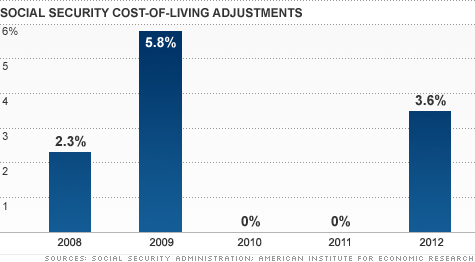Search News

NEW YORK (CNNMoney) -- Senior citizens will soon get their first raise in three years, the government announced Wednesday.
Social Security recipients will receive a cost of living adjustment of 3.6% starting in January.
Because inflation has been very low in recent years, beneficiaries have not gotten a COLA increase since 2009, when they received a 5.8% boost.
However, most seniors are not likely to receive the full amount of the COLA increase because the expected hike in Medicare Part B premiums could eat up part of the raise. The change in Medicare premiums should be announced next month.
For the past two years when Social Security benefits stayed the same, many seniors were shielded from the increase in Medicare premiums because of a "hold harmless" provision that protects more than 70% of beneficiaries. These recipients can't see their monthly Social Security checks decrease because of a Medicare hike.
However, high-income beneficiaries and new enrollees did see their benefits reduced because they are not covered under the provision. Medicare premiums rose by 4.4% for 2011.
The COLA increase is welcome news to many seniors who have seen their costs go up, while their monthly Social Security checks have remained flat, said David Certner, AARP's legislative policy director.
Social Security plays a vital role in keeping senior citizens and the disabled afloat. Nearly 55 million people receive Social Security. The average monthly check for the elderly will jump $43, to $1,229, while for the disabled, it will rise $39 to $1,111.
Social Security benefits represent about 41% of the elderly's income, according to the Social Security Administration. But 22% of married couples and 43% of singles rely on the monthly checks for 90% of their income.
Many seniors have felt squeezed since banks are paying virtually no interest on savings accounts and stock market declines has eroded their retirement accounts. Plus, health care costs have skyrocketed.
"This is good news for seniors, who certainly feel they are falling behind," Certner said. "When you talk to people, they don't feel costs are going down."
The higher inflation index also means that workers will pay more into the Social Security system, said Polina Vlasenko, research fellow at the American Institute for Economic Research. Next year, the Social Security tax will be levied on the first $110,100 of a person's wages, up from $106,800 this year.
Going forward, Social Security beneficiaries may not see such generous COLA increases. As part of the debt reduction talks, lawmakers are looking at changing the formula upon which the annual increase in based, Certner said. This could lower the COLA increase by several tenths of a percentage point, which may not sound like much but adds up over time, he said. ![]()
| Overnight Avg Rate | Latest | Change | Last Week |
|---|---|---|---|
| 30 yr fixed | 3.80% | 3.88% | |
| 15 yr fixed | 3.20% | 3.23% | |
| 5/1 ARM | 3.84% | 3.88% | |
| 30 yr refi | 3.82% | 3.93% | |
| 15 yr refi | 3.20% | 3.23% |
Today's featured rates:
| Latest Report | Next Update |
|---|---|
| Home prices | Aug 28 |
| Consumer confidence | Aug 28 |
| GDP | Aug 29 |
| Manufacturing (ISM) | Sept 4 |
| Jobs | Sept 7 |
| Inflation (CPI) | Sept 14 |
| Retail sales | Sept 14 |